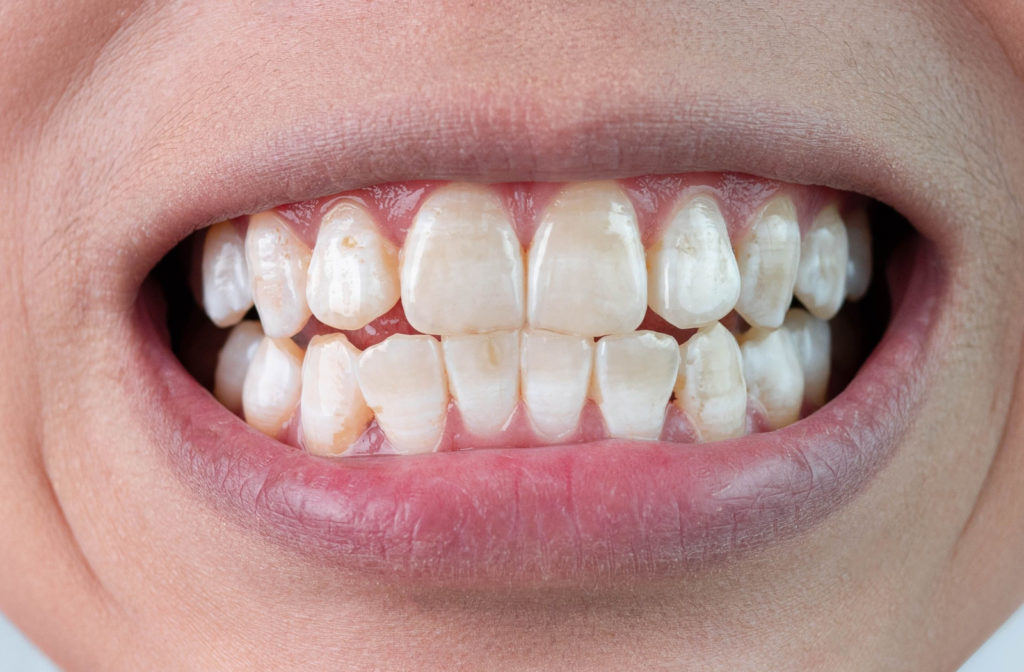Even though you may be taking great care of your teeth with brushing, flossing, and regular dental cleanings, white spots can still develop on your teeth. White spots can appear for various reasons, including dental fluorosis, enamel hypoplasia, and enamel demineralization.
Treatments for white spots are available to help you achieve an even, radiant white smile. Depending on the cause of the white areas, your dentist can recommend specific treatments. Talking to your dentist can help determine the right course of action to improve your smile.
Causes of White Spots on Teeth
Dental Fluorosis
Dental fluorosis, a condition that arises from excessive fluoride ingestion, manifests as white or brown-coloured spots on the teeth. While this cosmetic concern may affect the appearance of your smile, it does not pose any significant harm to overall health.
Fortunately, cosmetic dentistry offers a range of effective treatments to correct the discoloration caused by dental fluorosis. Options such as teeth whitening and veneers can be pursued to restore the natural aesthetics of your teeth.
Enamel Hypoplasia
Enamel hypoplasia, a dental condition characterized by thin or absent enamel, is a tooth defect that requires attention and treatment. This condition can arise due to a variety of factors, including:
- Genetics
- Vitamin deficiencies
- Trauma to the teeth
In order to address enamel hypoplasia, several treatment options are available. These may include the application of composite resin, the use of veneers, or the placement of a crown. By using these techniques, your dental team can effectively restore the appearance and functionality of your teeth affected by enamel hypoplasia.
Enamel Demineralization
Enamel demineralization is the loss of minerals from the tooth structure, particularly the enamel, and can lead to white areas on the teeth. This condition occurs when essential minerals like calcium and phosphate dissolve from the enamel due to the acid produced by bacteria in dental plaque.
Several factors contribute to enamel demineralization, including:
- Eating sugary or acidic foods and drinks
- Poor oral hygiene practices
- Insufficient saliva production
It is crucial to address enamel demineralization in its early stages to prevent the development of cavities. There are steps you can take to help remineralize your teeth, including:
- Maintaining sufficient saliva production by chewing sugar-free gum or rinsing your mouth with water after eating or drinking
- Using fluoride toothpaste and flossing regularly
- Avoiding sugary or acidic foods
- Scheduling regular dental check-ups
By incorporating these practices into your oral care routine, you can promote the health and strength of your teeth, safeguarding them against the effects of enamel demineralization.

Treatment for White Spots on Teeth
A visit with Dr. Cooper can identify the cause of white spots on your teeth and begin the appropriate treatment option.
Microabrasion
One effective treatment option for white spots on the teeth is microabrasion. The procedure is designed to target superficial discoloration and mild enamel defects, including white spots that can affect the aesthetics of a smile.
During microabrasion, your skilled dental team applies a combination of acidic and abrasive agents to the teeth, gently scrubbing away the discolouration. For surface stains, this can be a successful option. Following this process, the teeth are thoroughly rinsed, leaving behind a refreshed and revitalized appearance.
Dental Bonding
Dental bonding involves using composite resin, carefully colour-matched to blend seamlessly with your natural teeth to conceal the white spots. With your dentist’s expertise, the composite resin is skillfully applied, shaped, and hardened to cover the white spots.
The result is a strong and long-lasting restoration that eliminates the unsightly appearance of the white spots and enhances the overall uniformity of your smile.
Dental Veneers
Dental veneers, thin coverings typically made from porcelain, are skillfully applied to the surface of the teeth, enhancing their size, shape, and colour. In the case of white spots, veneers prove to be particularly beneficial as they can effectively mask these imperfections, resulting in a smile that exhibits a natural and cohesive shade. Veneers offer durability and longevity, maintaining the beautiful transformation for years.
Teeth Whitening
Teeth whitening effectively lightens the overall shade of the teeth to help minimize the visibility of these white spots.
There are two primary teeth whitening methods: in-office and take-home treatments. In-office teeth whitening involves a professional procedure performed by your dental professionals. Opalescence Boost is a chemically activated whitening solution containing potassium nitrate and fluoride to minimize sensitivity.
On the other hand, take-home teeth whitening treatments involve using customized trays worn over the teeth for a specified period. These treatments generally take longer to show results but offer convenience and flexibility. Opalescence Go includes prefilled, disposable trays with full molar-to-molar coverage so no teeth get missed.
To determine the most suitable teeth whitening option for your specific needs, it is essential to consult with your dentist. They can assess the severity of the white spots and recommend the appropriate treatment approach. Teeth whitening should be conducted under professional supervision to support safety and maximize results.
Preventing White Spots on Teeth
Preventing white spots on teeth is one way to maintain a radiant smile. Practicing good oral hygiene is one of the most effective ways to avoid white spots. Regular brushing and flossing help remove plaque and bacteria contributing to enamel demineralization.
Limiting sugary and acidic food and drinks can help minimize the risk of demineralization and protect the integrity of your tooth enamel. It is also essential to schedule regular dental exams and cleanings with the trusted professionals at Cooper Dental.
Your Dentist in Calgary, AB
Regular dental visits allow for early detection of any potential issues and provide an opportunity for thorough cleaning to remove plaque and tartar buildup. We’re here to help reduce the chances of developing white spots on your teeth and maintain your healthy, dazzling smile. Schedule your appointment with Cooper Dental.





